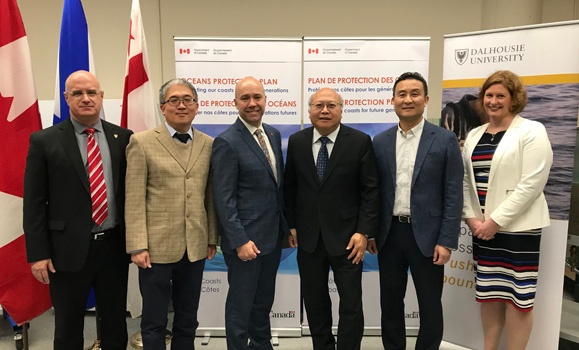The Government of Canada has invested approximately $523,000 in scientific research at Dalhousie to help protect Canadian waters in the event of an oil spill.
The announcement was made at the end of May at Dalhousie by Andy Fillmore, Member of Parliament for Halifax, on behalf of The Honourable Jonathan Wilkinson, the Minister of Fisheries, Oceans and the Canadian Coast Guard.
“The government of Canada is committed to keeping our oceans healthy, clean and safe for future generations,” says Minister Wilkinson in a news release. “Our new investment in science and research at Dalhousie will not only add to our scientific understanding of our oceans, but will also support two new scientific trainee positions.”
Haibo Niu, an associate professor in the Faculty of Agriculture, and Lei Liu, a professor in the Faculty of Engineering, will investigate strategies to better separate oil from water and examine the risk of spills in the Canadian Arctic Archipelago.
These projects are funded under the $45.5 million Multi-Partner Research Initiative, which aims to provide the best scientific advice to respond to spills in Canadian waters. This initiative connects leading researchers both in Canada and around the world. Their efforts will help improve knowledge of how spills behave, how to contain them and clean them up, and how to minimize their environmental impacts.
“Congratulations to Dr. Niu and Dr. Liu on this well-deserved recognition from Fisheries and Oceans Canada,” says Dr. Alice Aiken, vice-president research and innovation at Dalhousie. “Their work of marine oil spill risk assessment and response is truly world class, and we’re incredibly proud that it is happening at Dalhousie.”
Fast and efficient oil spill cleanup
Dr. Niu is looking at ways to improve oil spill models that are used for predicting the spread of oil in the ocean after a deep-water oil spill.
The Canadian Arctic Archipelago is an ecologically important area. Global warming will significantly reduce sea ice coverage in the Arctic and make it possible for the Northwest Passage to become a key shipping route between the Pacific Ocean and the North Atlantic Ocean. The environmental risks of ship-sourced oil spills in the area have not yet been well addressed.
“Oil is a big industry in Canada and with that comes the risk of oil spills,” Dr. Niu explains. “We need better models to better predict how far the oil will spread, the thickness of the spill and how much oil will surface if it is spilled. We have models like this to simulate the spread of oil on the surface, however our existing deep-water models are still very limited, due to our limited knowledge on droplet sizes.”
Through his extensive research, Dr. Niu will help improve oil spill models so that cleanup is fast and efficient, lessening the impact on wildlife and the environment.
“I want to understand what happens after an oil spill,” he explains. “I want to know the potential environmental impact and the impact on marine life. I want everyone else to understand this as well. If the public doesn’t have enough information about it, they will worry about it. And we don’t want them to worry about it.”
The goal of this project is to use a high resolution circulation model to assess risks from oil spills to conservation areas in the archipelago. Oil spill models from the project will help responders locate, identify the potential impacts of oil spilled in specific areas and influence decision-making.
Locating and identifying oil spills
The marine oil spill response could generate a large volume of oily wastes that can be up to 10-40 times greater than the original volume of spilled oil. Such oily wastes can be divided into liquid wastes (e.g., emulsified oil, non-emulsified oil, and wastewater) and solid wastes (e.g., spill containment booms, sorbent booms, debris, personal protective equipment, oily sand, gravel, and rocks, oily vegetation, dead animals).
The Canadian government and oil spill responders are facing a great challenge for their treatment and management due to the inherent complexities, high cost, and uncertain technological and regulatory difficulties and barriers.
The DFO’s funding for Dr. Liu’s project will involve trying to find cost-effective and efficient solutions to address both the liquid and solid waste issues generated from oil decanting and oil response operations.
The goal of this project is to design and create a processing unit using existing membrane technology together with other technologies to remove the harmful and high oil-content from the decanted oily wastewater. The compact unit has a small footprint and will be installed in the response barges/vessels for making on-scene treatment of the decanted oily wastewater become reality.
“This could not only dramatically improve the oil response capacity and efficiency by saving the storage space in barges, but also significantly save the lengthy time and high cost of hauling decanted water to shore for disposal,” says Dr. Liu.
A large volume of oily solid wastes are also generated from marine oil spill operations, and more importantly, its storage, disposal and management have been sophisticated dramatically by the issues of available facilities, capacity, efficiency, cost, regulatory and technical barriers. Another objective of Dr. Liu’s DFO project is to use advanced modeling techniques to assess the status quo of oily solid waste management practices along the eastern and western coasts of Canada, identify the appropriate treatment/disposal technologies for Canadian environment, and generate improved oily waste management strategies under different scenarios.
These strategy alternatives will be recommended to Canadian regulators, marine oil spill responders, and other industrial stakeholders for enhancing their capabilities and practices in managing the oily solid wastes generated from the marine oil spill operations.

